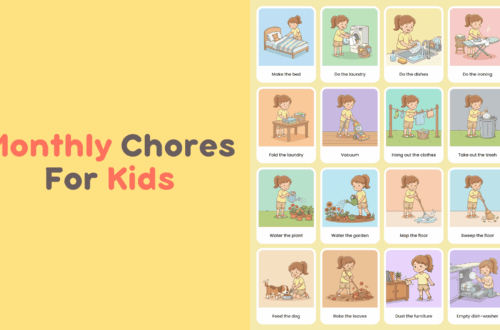By ages 6-8, kids are becoming more independent, learning discipline in school, and developing a stronger sense of responsibility. This makes it an ideal stage to expand their household chores. Giving children structured tasks not only helps with family routines but also builds skills like organization, accountability, and teamwork. Using tools for digital chore chart can make managing chores simple and motivating, ensuring consistency without arguments.
Why Chores Are Important for Ages 6-8
At this stage, children are eager to prove they can “do it themselves.” Assigning chores helps reinforce that sense of independence while teaching them the value of contributing to the family. It’s also a way to show kids how effort leads to results—a lesson that will serve them well in school and beyond.
Best Chores for Ages 6-8
Here are some age-appropriate tasks for elementary schoolers:
- Making their bed neatly every morning
- Packing and unpacking their school bag
- Helping prepare simple meals (like making a sandwich)
- Folding and putting away laundry
- Sweeping or vacuuming small areas
- Feeding pets and refilling water bowls
- Setting and clearing the table at mealtime
- Taking out light trash or recycling
With Kikaroo’s family chore tracker, parents can assign chores to each child, keep track of completions, and even add small rewards that keep kids motivated without nagging.
Making Chores Fun and Consistent
Children at this age love recognition and rewards. Turning chores into a points-based system, offering choices, or setting up “family chore challenges” can keep them engaged. A visual tracker, like the one in Kikaroo, helps kids stay motivated by clearly showing progress and rewards.
Tips for Parents to Encourage Success
- Be consistent—don’t change expectations daily.
- Offer gentle reminders, but let kids own the task.
- Recognize effort, not just results.
- Allow kids to take pride in their independence.
These steps help chores become natural habits rather than daily battles.
Conclusion – Building Responsibility Early
Elementary school is a critical time for teaching responsibility and building good habits. By introducing a clear, age-appropriate chore routine, parents can help kids develop independence while also lightening the load at home. With Kikaroo’s simple tracking and rewards, creating a balanced and fun system is easier than ever.

 Home
Home Features
Features Testimonials
Testimonials Downloads
Downloads FAQ
FAQ Blog
Blog








